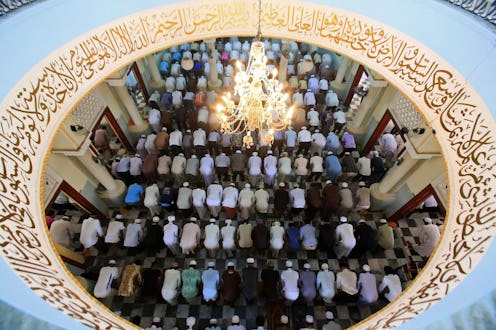News
How Ramadan Is Celebrated Around The World
On June 17, nearly 1.6 billion Muslims begin their month of fasting for Ramadan. Fasting, in itself, isn’t out of the ordinary. It’s a common observance for nearly all major religions. While Christians and Jewish practice fasting for Lent and Yom Kippur using different methods, Muslims around the world refrain from drinking food or water from dawn to sunset. (Yes — not even water.)
Fasting (sawm) is one of the five pillars in Islam that — alongside the five daily prayers (salat), almsgiving (zakat), piligrimage to Mecca (hajj), and the statement of faith (shahada) — are mandatory for all Muslims to commit. While it may seem torturous already, Muslims are also supposed to refrain from engaging in bad speech (backbiting, gossip, and swearing) and from having sex. With the holy month hitting right in the middle of summer, in some places with a sweltering heat of nearly 100 degrees Fahrenheit, the Arabic meaning of “Ramadan” as “scorching heat” truly fits this time of year.
Despite all the struggles that are associated from fasting nearly 17 hours every day for 30 days (or fasting the longest day of the year — the summer solstice), the spiritual rewards of Ramadan are truly gratifying for Muslims. According to Islamic belief, the rewards given by God for the pious practices by Muslims are multiplied. This is particularly why during this time of year, the amount of charity and prayers given by Muslims are at an all-time high for the year. But more importantly, the month itself is a significant religious symbolic on-going event for Muslims. It is believed during this month of the Islamic (lunar) calendar, the Qu’ran was first revealed to Prophet Mohammed. Although Ramadan isn't technically considered an Islamic celebration (the end of Ramadan, Eid al-Fitr, is the religious holiday), it's a month of reflection, appreciation, and festivities to commemorate the central foundation of a religion followed by billions around the word.
Muslims in Saudi Arabia congregate in the holiest city, Mecca, in the holiest month to make their daily five prayers, break their fast sitting down with strangers as new friends, and then return to the mosque to recite the Qu'ran all night long. In the United Arab Emirates, the cities of Dubai and Abu Dhabi are illuminated with crescent moons and the shopping malls are flooded with extravagant displays of Ramadan couture. Thousands of Palestinian Muslims surround the Al-Aqsa mosque (commonly known as "the Dome of Rock") shoulder to shoulder as they offer their prayers to God after a long day of fasting atop a sea of rubble in the conflict zone.
And while Islam is one of the largest religions in the world, with different implementations of cultures and traditions spanning across all seven continents, and the date remains as the staple food that unites Muslims around the world, the communal and spiritual transcendence remains consistent. The reflections and emotions are often similar: the feeling of having a closer connection with God, finding peace within your heart and mind, the realization that more time needs to be spent with your family and friends, and the motivation to become a better Muslim and human being beyond just the holy month of Ramadan.
